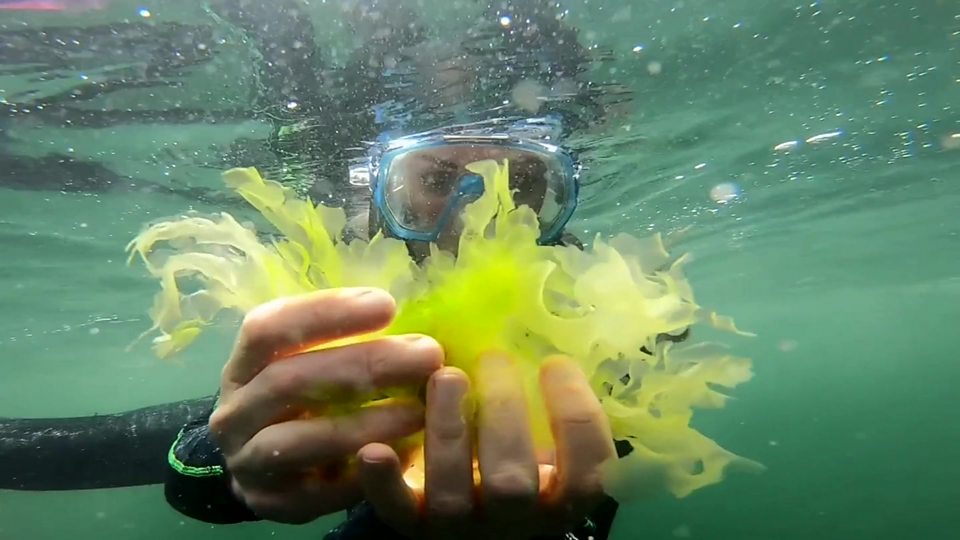本集内容
Farming the sea for the future of food 发展海洋养殖业 未来食物有水可依
学习要点
有关 “farming(养殖)” 的词汇
边看边答
Are spiny sea urchins just seen as a pest?
文字稿
The sea could be the food bowl of the future. In Jervis Bay, south of Sydney, seaweed, which is rich in fibre and omega 3, is grown and harvested.
海洋可能是未来的粮仓。在悉尼南部的杰维斯湾,海藻,这种富含纤维和奥米茄-3脂肪酸的藻类植物被种植和收获。
Pia Winberg is a marine scientist who runs Australia’s first food-grade farmed seaweed company. Her crop is grown alongside mussels and is used as an additive in pasta and other products.
皮娅·温伯格是一位海洋科学家,她经营澳大利亚第一家食品级海藻养殖公司。她的海藻与贻贝一起被养殖,被用作意大利面食和其它食品的添加物。
Seaweed is also reared in large tanks, where it absorbs carbon dioxide waste from a wheat processing factory. The business is small, but could help to reduce the ecological footprint of traditional farming.
海藻也在大水箱中饲养,在水箱里,海藻吸收来自一个小麦加工厂的二氧化碳废物。这家公司规模不大,却可以帮助减少传统养殖业产生的生态足迹。
Pia Winberg. Founder, PhycoHealth
If we used ten per cent of seaweed instead of wheat in breads and pastas, we’ve eliminated a million hectares of land, we’ve eliminated all of the carbon dioxide emissions associated with that, and we’ve also reduced the pressures on very precious fresh water.
皮娅·温伯格 PhycoHealth 创始人
“如果我们在面包和意大利面食中使用10%的海藻,而不是小麦,就能省下100万公顷的土地,消除所有与之相关的二氧化碳排放,同时,还能减少宝贵的淡水资源短缺的压力。”
Spiny sea urchins are another blue economy resource. They can devastate marine habitats, but a recent competition for environmental start-ups in Australia, saw them not as a pest but a delicacy.
多刺海胆虫是另一种蓝色经济资源。多刺海胆虫可以破坏海洋栖息地,但在澳大利亚,近期一个为环保创业公司举办的比赛证明了多刺海胆不是有害动物,而是美味佳肴。
Aquaculture in Australia is dominated by the farming of salmon, tuna, and oysters. But researchers say the industry should be far, far bigger. Australia has the world’s third largest Exclusive Economic Zone, with access to vast areas of ocean.
澳大利亚的水产养殖业以鲑鱼、金枪鱼和牡蛎的养殖为主。但研究人员表示,这个产业的规模应该比现有的大得多。澳大利亚拥有世界第三大专属经济区,坐拥广阔的海域。
Martina Doblin, CEO Sydney Institute of Marine Science
By 2050 we will have some ten billion people on the planet, and about half the food they eat will come from the ocean. So, we really do need to pay attention to the way that we manage the blue economy – generating wealth from the ocean but in a sustainable way.
玛蒂娜·多布林 悉尼海洋科学研究所首席执行官
“到2050年,地球上将有大约100亿人口,人们所吃的食物有一半将来自海洋。所以,我们确实需要关注管理蓝色经济的方式,如何从海洋中创造财富,但要以可持续的方式去做。”
Farming at sea has its challenges. Infrastructure has to be robust, as do supply chains and biosecurity. But get these things right, and the ocean might just be the next great economic frontier.
海上农业也有它自身的挑战。基础设施必须健全,供应链和生物安全也必须如此。但如果这些事情都做对了,海洋可能就会成为下一个重要的经济领域。
词汇
food bowl 粮仓
reared 被饲养
blue economy 蓝色经济,发展依赖于海洋或与海洋相关的环境友好型产业和经济
aquaculture 水产养殖业
supply chains 供应链
问题答案
No. They are also seen as a delicacy – something that is rare or expensive to eat.


 3342次下载
点击下载
3342次下载
点击下载
 2621次下载 点击下载
2621次下载 点击下载
 4734次下载 点击下载
4734次下载 点击下载
 1854次下载 点击下载
1854次下载 点击下载
 1391次下载 点击下载
1391次下载 点击下载
 1391次下载 点击下载
1391次下载 点击下载











